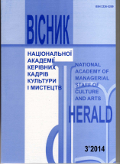HOSPITALITY OF UKRAINIANS AS A FORM OF CULINARY TECHNOLOGIES RECEPTION IN THE MULTICULTURAL SPACE OF UKRAINE (ON THE EXAPMLE OF GASTRONOMIC FESTIVALS)
DOI:
https://doi.org/10.32461/2226-3209.3.2014.138100Keywords:
hospitality, reception, tradition, culinary technologies, gastronomic festivalAbstract
The paper considers hospitality as one of the elements of culinary technology, which embodies both physical and spiritual components of culture. In the contemporary and traditional informational space, it occupies an important
place as a means of communication. The hospitality of Ukrainians was analyzed as a form of culinary technologies
reception in the multicultural space of Ukraine on the example of gastronomic festivals.
It was pointed out on the problem in the national science – lack of comprehensive study of Ukrainian hospitality,
which is still regarded as an essential structural element of Ukrainian culture and traditional rites. However, hospitality of Ukrainians as a form of culinary technologies reception in the context of cultural studies has not been yet treated as a scientific interest.
Culturological approach to understanding of hospitality was made in the works of L. Artyukh, K. Avdeev, A. Voropay, J. Holovatsky, O.Koshyts, Y.Lotmana, Y.Markovycha, J.Riabtseva, S.Skurativsky, P.Chubynsky which concern the peculiarities of the everyday life in different regions of Ukraine, as well as the lifestyles of various segments of Ukrainian society.
Hospitality contributes to the self-regulation of society, while maintaining stability and external tolerance to the other, not similar and it is the determining factor in the formation of tolerant behaviors of all multicultural space in Ukraine. It includes culture of communication, culture of behavior, culture of service, food culture, and aspects of social culture.
During the gastronomic festivals, culture creation system takes the form of culinary technologies reception in the
multicultural space of Ukraine. Through a feast, it begins the identification of a person in the community as an expression of human need to define his or her place, more precisely – social identification.
Cooking is closely intertwined with ecotourism; it has become a part of gastronomic festivals which is an understanding not only of the local culture, but also of the culture of the participants. This kind of art is admired by people and forces them to overcome many miles to see the cuisines of other nations, to try a particular dish. This is how this concept arose – a culinary/gastronomic tourism as the direction of contemporary international tourism connected with the exploring of national culinary traditions.
Cooking is an ancient art that appeared on our planet before the famous stone paintings. Primitive culinary of
primitive peoples had a long and difficult path of its development before it turned into an exquisite one. Having absorbed the achievements of contemporary science, engineering, technology, every epoch and every nation have been created their culinary school.
Hospitality as a form of cultural technologies reception in the multicultural space of Ukraine was formed by natural, social, economic, and historical factors. This was facilitated by resettlement at different times on the territory of
Ukraine of Hungarians, Turks, Tatars, Germans, Ruthenians, Austrians, Czechs and close proximity to other countries.
For example, Odessa cuisine was formed under the influence of Russian, largely Jewish, Georgian, Armenian, Uzbek, Bulgarian, Moldavian and Greek cuisine; however, a number of dishes are notable for its originality. Thus, the coastal location of settlements makes a large number of dishes from fish and seafood in a traditional kitchen.
Gastronomic Festivals (International Festivals – "White Wine", "Hutsulska Ripa", "Berlibasky Banush", "Zolotyi
Goulash", "Verkhovynska Yafyna", "Delicious Spas", "Carpathian Network of Culinary Heritage", "Bukovyna Hospitality", "Art of varenyky modeling", "erunam Slava", "Sviato Pampuha","Borsch'yiv", etc.) are prime examples of hospitality in the form of culinary technologies reception in multicultural space of Ukraine, because they are directly intertwined with the everyday life, social reality of livelihoods of people; it is largely a product and reflection of the culture econutrition.
As for the reception, it gains in our study the value of understanding and perception of the other/others' cultural
orientations (norms, rules, values, beliefs), that is the central cultural standards, including hospitality as a form of culinary technologies in multicultural space of Ukraine. It was analyzed in the frame of receptive aesthetics – as a kind of perception of culinary art by the audience in multicultural space.
It was proved that in such changing phenomenon as gastronomic festivals, in the food culture system, remains
a trend towards stability, susceptibility to preserve traditions. Such events do not violate the structure of traditional
Ukrainian food; moreover, they complement its expanding range of welcoming food at the same time passing them on from generation to generation. In this way the assimilation in a multicultural environment of Ukraine happens, its cultural absorption by traditional cuisine. The external influences get intertwined with deep traditions, and this symbiosis is in favor of contemporary ecoculture of food.Downloads
Published
Issue
Section
License
Authors who publish with this journal agree to the following terms:
1. Authors retain copyright and grant the journal right of first publication with the work simultaneously licensed under a Creative Commons Attribution License International CC-BY that allows others to share the work with an acknowledgement of the work's authorship and initial publication in this journal.
2. Authors are able to enter into separate, additional contractual arrangements for the non-exclusive distribution of the journal's published version of the work (e.g., post it to an institutional repository or publish it in a book), with an acknowledgement of its initial publication in this journal.
3. Authors are permitted and encouraged to post their work online (e.g., in institutional repositories or on their website) prior to and during the submission process, as it can lead to productive exchanges, as well as earlier and greater citation of published work (See The Effect of Open Access).


